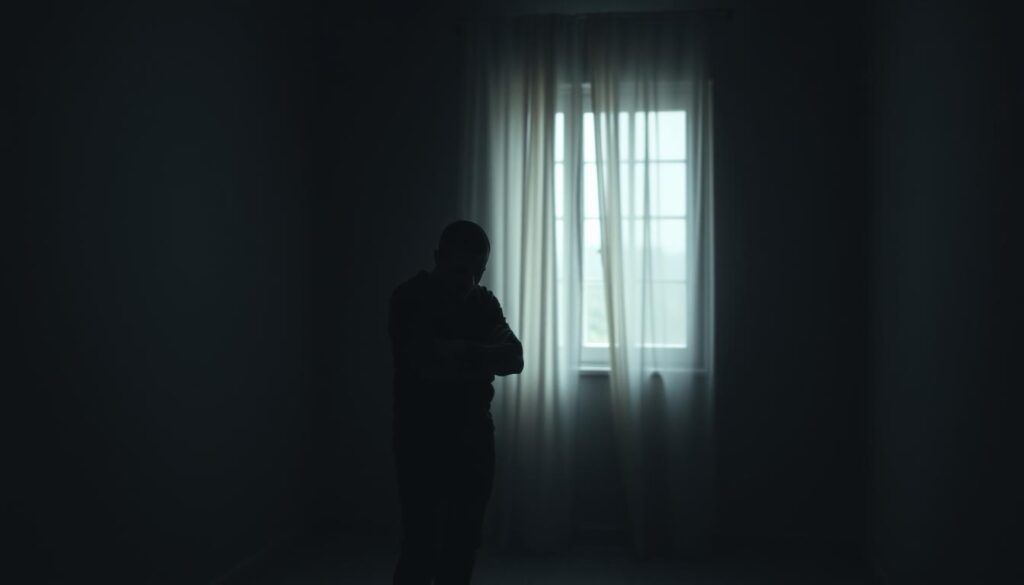Explore the realities of Avoidant Personality Disorder and find reliable information to better understand this often misunderstood disorder.
Avoidant personality disorder: This mental health issue makes people very anxious in social situations and causes them to avoid these situations. It can make it hard to keep friends, reach personal goals, and feel good about oneself.
APD is very similar to social anxiety disorder. Knowing the differences and similarities is key to getting the right help.

Understanding avoidant personality disorder can be tough. But, by learning about it, people can grasp its symptoms, causes, and how to deal with it. It affects not just the person but also their family and friends.
By learning more about APD and its link to social anxiety, we can help create a better world for those dealing with it.
Key Takeaways
- Avoidant personality disorder affects about 1.8% of adults in the United States.
- APD is marked by social anxiety and avoiding people, leading to feelings of loneliness and low self-worth.
- It’s important to know the differences and similarities between APD and social anxiety disorder for proper diagnosis and treatment.
- APD can greatly hinder a person’s ability to make and keep friends, reach personal goals, and interact with others.
- By diving into the realities of APD, people can understand its symptoms, causes, diagnosis, treatment, and coping strategies.
- APD is a complex issue that not only affects the individual but also their loved ones.
Understanding Avoidant Personality Disorder
Avoidant Personality Disorder (APD) is a mental health issue. It makes people avoid social situations, feel not good enough, and be very sensitive to criticism. Knowing the symptoms of apd is key. People with APD find it hard to make friends, reach their goals, and talk to others because they fear being rejected or criticized.
The causes of apd are still being studied. But, it’s thought that genes, environment, and social factors play a role. Knowing what causes APD helps find better treatment for apd. Treatments include therapy, counseling, and medicine to help manage symptoms and improve life quality.
Many people think APD is just being shy or introverted. But, it’s a serious mental health issue that needs professional help. By understanding the symptoms of apd and the causes of apd, people can get the help they need to live better lives.
What is APD?
APD is a mental health condition. It makes it hard for people to make friends, reach their goals, and talk to others.
Common Misconceptions
Some common misconceptions about APD include:
- APD is the same as being shy or introverted
- APD is a result of poor social skills
- APD is not a treatable condition
Impact on Daily Life
APD can greatly affect daily life. It makes it hard for people to:
- Make and keep friends
- Reach their goals
- Talk to others
The Psychology Behind Social Avoidance
Social anxiety disorder affects millions globally, causing intense fear in social or performance situations. This fear often leads to avoiding social interactions, a common trait in avoidant personality disorder. Therapy, like cognitive-behavioral therapy (CBT), helps individuals face and change negative thoughts and behaviors that cause them to avoid social situations.
Several factors contribute to social avoidance:
- Genetic predisposition
- Environmental factors, such as childhood trauma or bullying
- Psychological factors, such as low self-esteem or fear of rejection
People with social anxiety disorder may feel a rapid heartbeat, sweat, and tremble. They also experience anxiety, fear, and self-consciousness. Therapy for avoidant personality disorder teaches coping strategies to manage these symptoms and enhance life quality.
It’s crucial to know that both social anxiety disorder and avoidant personality disorder are treatable. With proper therapy and support, individuals can manage their symptoms and break free from social avoidance.
| Condition | Symptoms | Treatment |
|---|---|---|
| Social Anxiety Disorder | Excessive fear of social situations, anxiety, self-consciousness | Cognitive-behavioral therapy (CBT), medication |
| Avoidant Personality Disorder | Social avoidance, fear of rejection, low self-esteem | Therapy for avoidant personality disorder, CBT, medication |
Recognizing the Signs and Symptoms of APD
It’s important to know the signs of Avoidant Personality Disorder (APD). A full diagnosis of apd looks at a person’s symptoms, actions, and health history. The symptoms of apd show up in emotions, actions, and physical signs.
Feeling anxious, fearful, or not good enough are emotional signs. Avoiding social situations, putting things off, or trying too hard to please others are behavioral signs. Physical signs might be feeling tense, tired, or having trouble sleeping. Knowing these signs helps in finding ways to cope with APD.
Some common signs of APD include:
- Social avoidance or feeling not good enough in social situations
- Hard time making and keeping friends
- Feeling low about oneself or not confident
- Physical signs like tension or feeling very tired
Spotting these signs is the first step to getting help and finding ways to cope with APD. A mental health expert can give a detailed diagnosis of apd. They can also help create a plan to treat it.
Understanding the symptoms of apd and getting help can help manage them. Good coping strategies for apd include therapy, joining support groups, and taking care of oneself.
Root Causes and Risk Factors
Understanding the causes of apd is key to preventing and treating it. Studies show that people with a family history of avoidant personality disorder or social anxiety disorder are at higher risk. Childhood trauma or bullying can also play a role in developing apd.
Some main risk factors for avoidant personality disorder include:
- Genetic predisposition
- Childhood trauma or abuse
- Bullying or social isolation
- Family history of social anxiety disorder or apd
It’s important to know that apd’s causes are complex. They involve genetics, environment, and psychology. By understanding these, people can lower their risk and get help when needed.
In summary, knowing the causes and risk factors of apd is vital. By recognizing the impact of social anxiety disorder and other factors, people can work towards prevention and treatment. This can greatly improve their well-being.
| Cause | Risk Factor | Prevention Strategy |
|---|---|---|
| Genetic predisposition | Family history of apd or social anxiety disorder | Seek professional help and counseling |
| Childhood trauma or abuse | History of bullying or social isolation | Develop coping mechanisms and support networks |
| Environmental factors | Exposure to stressful or traumatic events | Practice self-care and stress management techniques |
Diagnosis and Professional Assessment
Diagnosing Avoidant Personality Disorder (APD) needs a detailed look at a person’s symptoms, actions, and health history. A mental health expert, like a psychologist or psychiatrist, makes the diagnosis. They use the DSM-5’s criteria. They check for signs like avoiding social situations, fear of being rejected, and feeling not good enough.
Getting a proper diagnosis is key to finding the right therapy for APD. It helps experts create a treatment plan that might include therapy, medicine, and lifestyle changes. The aim is to help people feel better about themselves and build stronger relationships.
- Standardized questionnaires and surveys
- Structured interviews
- Behavioral observations
Getting a thorough diagnosis and assessment is vital for effective APD treatment. With a mental health professional’s help, people can make a plan to manage their symptoms. This improves their life quality.
Treatment Options and Therapeutic Approaches
People with avoidant personality disorder can find help through different treatments. Therapy for avoidant personality disorder is a key part of treatment. It helps them face and change negative thoughts and actions that lead to avoiding social situations.
For apd treatment, a mix of psychotherapy, medication, and lifestyle changes might be needed. Coping strategies for apd include learning to relax, boosting self-esteem, and improving social skills. Common therapies include cognitive-behavioral therapy (CBT) and psychodynamic therapy.
Medication like SSRIs might also be used to help with anxiety or depression. Working closely with a mental health expert is crucial to create a treatment plan that fits each person.

- Learn relaxation techniques to manage anxiety
- Build self-esteem through positive affirmations
- Develop social skills through gradual exposure to social situations
By using these treatments and therapies, people with avoidant personality disorder can better manage their symptoms. This can greatly improve their life quality.
| Treatment Option | Description |
|---|---|
| Cognitive-Behavioral Therapy (CBT) | Helps individuals identify and challenge negative thought patterns |
| Psychodynamic Therapy | Explores the underlying causes of social avoidance |
| Medication | Manages symptoms of anxiety or depression |
Living with Avoidant Personality Disorder
People with avoidant personality disorder often struggle with social anxiety and feeling not good enough. To cope, they can try deep breathing, mindfulness, and meditation. These strategies help manage their feelings.
Having a support system is key. This can mean joining a support group or talking to friends and family. Online communities are also helpful. Connecting with others who get it helps them feel less alone and more in control.
Important self-care steps include:
- Regular exercise to reduce anxiety and improve mood
- Engaging in creative activities, such as art or music, to express emotions and build confidence
- Practicing self-compassion and challenging negative self-talk
By using these strategies, people with avoidant personality disorder can handle their symptoms better. It’s also important to address social anxiety disorder, which often goes hand in hand with apd.
With the right strategies, support, and self-care, individuals with avoidant personality disorder can manage their symptoms. This way, they can live a more fulfilling life.
| Strategy | Benefits |
|---|---|
| Deep breathing exercises | Reduces anxiety and stress |
| Support groups | Provides social support and connection |
| Self-compassion practices | Improves self-esteem and confidence |
Supporting Someone with APD
Supporting someone with avoidant personality disorder (APD) needs a caring and understanding way. It’s key to know APD is a mental health issue that needs a treatment for apd. People with APD might need help and special arrangements to deal with their feelings, which can be like those of people with social anxiety disorder.
Here are some ways to help someone with APD:
- Encourage them to get professional help, like therapy for avoidant personality disorder
- Make a supportive and non-judgmental space for them
- Help them find ways to cope and improve their communication skills
Learning about APD and how it affects daily life is also crucial. This way, you can understand what they’re going through better. With the right help and treatment for apd, people with APD can manage their symptoms and feel better overall.

Conclusion: Moving Forward with Hope and Understanding
Avoidant personality disorder is a complex mental health issue. It needs empathy, education, and support. People with apd often face social anxiety disorder, which affects their daily lives a lot.
By understanding the challenges of apd, we can help create a supportive environment. This is crucial for those dealing with it.
With the right treatment, people with avoidant personality disorder can manage their symptoms. They can learn to cope better and feel better overall. It’s key to have a strong support system, including family, friends, and mental health professionals.
This support helps individuals with apd face their struggles more confidently. It makes a big difference in their lives.
As we move forward, spreading awareness about avoidant personality disorder is vital. Sharing knowledge and resources helps reduce stigma. It encourages people to seek help when they need it.
With hope, compassion, and the right support, people with apd can live fulfilling lives. They can overcome social anxiety disorder and thrive.
FAQ
Q: What is Avoidant Personality Disorder (APD)?
A: Avoidant Personality Disorder (APD) is a mental health issue. It makes people avoid social situations and feel not good enough. They also worry a lot about what others think of them.
Q: What are the symptoms of APD?
A: Symptoms include feeling anxious or not good enough. People with APD might avoid social situations or try too hard to please others. They might also feel tired or have trouble sleeping.
Q: What causes APD?
A: APD comes from a mix of genetics, environment, and psychology. Family history and childhood trauma can play a big role. It’s not just one thing.
Q: How is APD diagnosed?
A: Doctors look at symptoms, behavior, and medical history to diagnose APD. They use tools like the DSM-5 to make a diagnosis.
Q: What are the treatment options for APD?
A: Treatment includes therapy, medication, and lifestyle changes. Therapy helps change negative thoughts and behaviors. It’s a key part of treatment.
Q: Can APD be managed with self-care practices?
A: Yes, self-care like exercise and meditation can help. Building a support network also helps. It makes people feel less alone.
Q: How can I support someone with APD?
A: Be understanding and supportive. Learn about APD and offer encouragement. Recognize it’s a mental health issue that needs professional help.
Q: Is APD a curable condition?
A: APD is treatable, but not always curable. With the right help, people can manage their symptoms and live well.
Q: Can APD be prevented?
A: Early treatment can help prevent APD. Teaching healthy coping skills can also reduce risk. It’s about building resilience.
